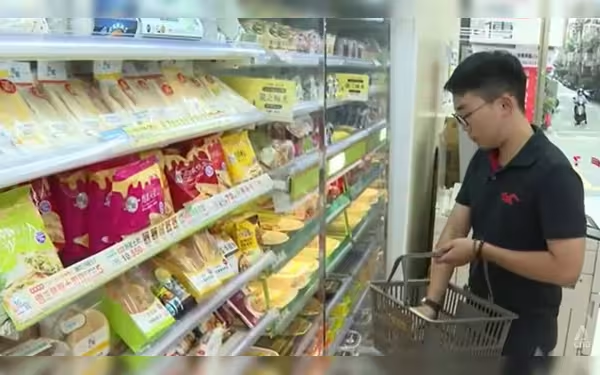Saturday, November 16, 2024 03:16 PM
Young Taiwanese Embrace Near-Expired Food Amid Rising Living Costs
- Young Taiwanese buy near-expired food to save money.
- Trend highlights awareness of food waste reduction.
- Convenience stores offer discounted items for budget-conscious youth.
 Image Credits: channelnewsasia
Image Credits: channelnewsasiaYoung Taiwanese are turning to near-expired food to cope with rising living costs, promoting sustainability and budget-friendly choices.
The rising cost of living has become a pressing issue for many around the globe, and Taiwan is no exception. As prices for everyday essentials continue to climb, young people on the island are finding creative ways to cope with their financial challenges. One such method has gained popularity: purchasing near-expired food items at convenience stores. This trend has sparked conversations on social media, where users have humorously dubbed these discount periods as “beggar hour.”
Among those embracing this trend is Bill Lin, a substitute high school teacher. Like many of his peers, Lin has turned to discounted foods as a practical solution to the soaring costs of living. With prices for basic necessities increasing, young Taiwanese are seeking ways to stretch their budgets without sacrificing their meals. Convenience stores, which are abundant in Taiwan, offer a variety of food items that are nearing their expiration dates at significantly reduced prices.
This phenomenon reflects a broader shift in consumer behavior, particularly among younger generations who are more open to exploring unconventional options. The idea of buying near-expired food may seem unappealing to some, but for many, it represents a smart and economical choice. It allows them to enjoy meals while also being mindful of their finances.
Moreover, this trend highlights a growing awareness of food waste. By purchasing items that are still safe to eat but nearing their expiration, young people are not only saving money but also contributing to reducing food waste. This dual benefit makes the practice even more appealing.
As the cost of living continues to rise, it is likely that more individuals will adopt similar strategies. The concept of “beggar hour” may evolve, but the underlying message remains clear: young people are resourceful and willing to adapt to challenging economic conditions. In a world where financial pressures are ever-increasing, finding innovative solutions like these can make a significant difference in daily life.
The trend of purchasing near-expired food in Taiwan is more than just a quirky social media phenomenon. It reflects the resilience and adaptability of young people facing economic challenges. As they navigate the complexities of modern living, such practices not only help them save money but also promote a more sustainable approach to consumption. This situation serves as a reminder that sometimes, thinking outside the box can lead to practical solutions that benefit both individuals and the environment.













